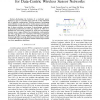Free Online Productivity Tools
i2Speak
i2Symbol
i2OCR
iTex2Img
iWeb2Print
iWeb2Shot
i2Type
iPdf2Split
iPdf2Merge
i2Bopomofo
i2Arabic
i2Style
i2Image
i2PDF
iLatex2Rtf
Sci2ools
140
click to vote
GLOBECOM
2007
IEEE
2007
IEEE
A TDMA-based Scheduling and Routing Algorithm for Data-Centric Wireless Sensor Networks
—Recharging the batteries of a moribund sensor deployed as part of a wireless sensor network is often infeasible due to logistical considerations. With the purpose of prolonging sensor lifetime in such data-centric wireless sensor networks and with emphasis on TDMA-based routing and the efficient scheduling of sensor activities, we propose a mixed-integer nonlinear programming mathematical model, the objective of which is to minimize the total energy consumed by nodes and encompasses dynamic power range, collision free transmission, routing paths, and data aggregation tree constraints. Performing Lagrangean Relaxation, we find a near-optimal solution and verify that our proposed algorithm is energy efficient and bounds latency within a reasonable range. Our experiment results confirm improvement over data aggregation algorithms.
Data-centric Wireless Sensor | GLOBECOM 2007 | Sensor | Telecommunications | Wireless Sensor Networks |
Related Content
| Added | 02 Jun 2010 |
| Updated | 02 Jun 2010 |
| Type | Conference |
| Year | 2007 |
| Where | GLOBECOM |
| Authors | Yean-Fu Wen, Frank Yeong-Sung Lin, Hung-Shi Wang |
Comments (0)

